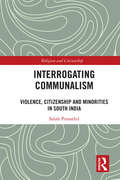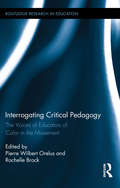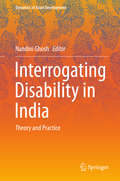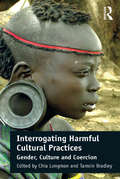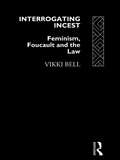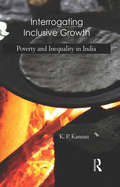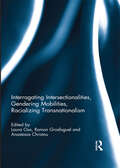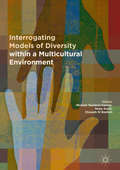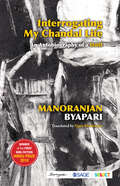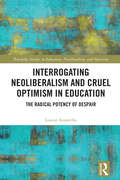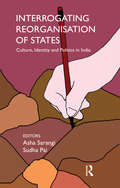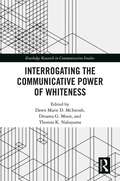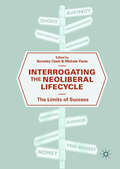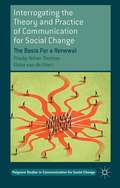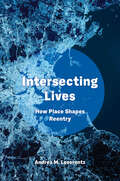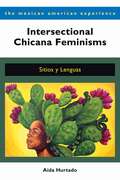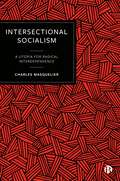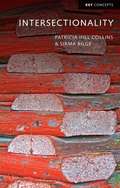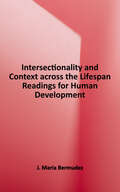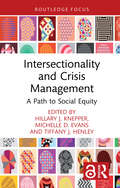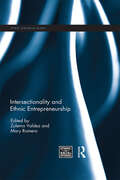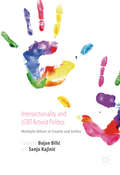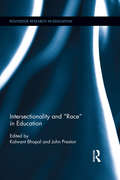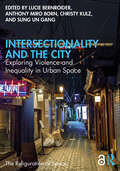- Table View
- List View
Interrogating Communalism: Violence, Citizenship and Minorities in South India (Religion and Citizenship)
by Salah PunathilThis book examines conflict and violence among religious minorities and the implication on the idea of citizenship in contemporary India. Going beyond the usual Hindu-Muslim question, it situates communalism in the context of conflicts between Muslims and Christians. By tracing the long history of conflict between the Marakkayar Muslims and Mukkuvar Christians in South India, it explores the notion of ‘mobilization of religious identity’ within the discourse on communal violence in South Asia as also discusses the spatial dynamics in violent conflicts. Including rich empirical evidence from historical and ethnographic material, the author shows how the contours of violence among minorities position Muslims as more vulnerable subjects of violent conflicts. The book will be useful to scholars and researchers of politics, political sociology, sociology and social anthropology, minority studies and South Asian studies. It will also interest those working on peace and conflict, violence, ethnicity and identity as also activists and policymakers concerned with the problems of fishing communities.
Interrogating Critical Pedagogy: The Voices of Educators of Color in the Movement (Routledge Research in Education)
by Pierre Wilbert Orelus Rochelle BrockEducators, teacher practitioners, and social activists have successfully used critical pedagogy as a tool to help marginalized students develop awareness and seek alternative solutions to their poor educational and socioeconomic situations. However, this theory is often criticized as being mostly dominated by privileged white males, bringing issues of race and gender to the forefront. This volume provides insight on how critical pedagogy can be helpful to scholars and teachers alike in their analysis of racial, gender, linguistic and political problems. It features a wide range of respected scholars who examine the way and the degree to which critical pedagogy can be used to improve education for students of color, women and other marginalized groups.
Interrogating Disability in India
by Nandini GhoshThis book discusses the multifaceted concept of disability in the context of India. Through analyses of theoretical propositions of disability in South Asia and empirical explorations of the lives of persons with disabilities in India, this book not only brings to the forefront a hitherto unexplored realm in academic discourse, but also bridges the gap between theory and lived reality, and between policy and practice. Thus, it is an important addition to the field of development studies in South Asia. The papers herein represent multidisciplinary and interdisciplinary perspectives from architects, lawyers, sociologists, political scientists, historians, economists and linguists to social work practitioners from the grassroots level. This range of insights from different disciplines allows for the exploration of a wide range of issues around disability and the lives of disabled people, moving from theoretical assumptions to exploring structural and infrastructural barriers, to problematizing different aspects of the lives of disabled people, and from objective realms to more subjective domains. Along with students and researchers of disability studies, this book is of interest to a diverse readership encompassing the social sciences, mental health, and development studies.
Interrogating Harmful Cultural Practices: Gender, Culture and Coercion
by Tamsin Bradley Chia LongmanThis volume explores a variety of ’harmful cultural practices’: a term increasingly employed by organizations working within a human rights framework to refer to certain discriminatory practices against women in the global South. Drawing on recent work by feminists across the social sciences, as well as activists from around the world, this volume discusses and presents research on practices such as veiling, forced marriage, honour related and dowry violence, female genital ’mutilation’, lip plates and sex segregation in public space. With attention to the analytic utility of the notion of harmful cultural practices, this volume explores questions surrounding the contribution of feminist thought to international and NGO policies on such practices, whether western beauty practices should be analysed in similar terms, or should the notion as such from an anthropological perspective be rejected, how harmful cultural practices relate to processes of culturalization, religionization and secularization, and how they can be challenged, come to transform and disappear. Presenting concrete, empirical case studies from Africa, South East Asia, Europe and the UK Interrogating Harmful Cultural Practices will be of interest to scholars of sociology, anthropology, development and law with interests in gender, the body, violence and women’s agency.
Interrogating Incest: Feminism, Foucault and the Law (Sociology of Law and Crime)
by Vikki BellWinner of British Sociological Association Philip Abrams Memorial Prize 1993 Within feminism incest has often been subsumed under a discussion of sexual violence and abuse. Yet, important as this is, there has been little account of how feminist work itself relates to other ways of talking about and understanding incest.In Interrogating Incest Vikki Bell focuses on the issue of incest and its place in sociological theory, feminist theory and criminal law. By examining incest from a critical Foucauldian framework she considers how feminist discourse on incest itself fits into existing ways of talking about sex. Closely surveying the historical background to incest legislation and the theoretical issues involve, Vikki Bell delineates their practical implications and shows what uncomfortable questions and important dilemmas are raised by the criminalisation of incest.
Interrogating Inclusive Growth: Poverty and Inequality in India
by K. P. KannanThe high growth performance of the Indian economy since the launch of economic reforms in the early 1990s has been much lauded. But how much of this growth has made its way to the poor? In a radical assessment of ‘inclusive growth’, this book probes the impact of neo-liberal policies on employment, poverty and inequality. It critiques the claim that market-friendly economic reform policies ‘trickle down’ to the poor and reduce poverty and deprivation. The author uses exhaustive data — from the formal and informal sectors — to create a profile of the aam aadmi. He advocates the need for a broad-based growth and development strategy that alone will address the many-sided social and economic inequalities in India. The volume will be useful to scholars and students of economics, development studies, labour studies, and sociology.
Interrogating Intersectionalities, Gendering Mobilities, Racializing Transnationalism
by Laura Oso, Ramon Grosfoguel and Anastasia ChristouEncouraging a conversation among scholars working with questions of transnationalism from the perspective of gender and race, this book explores the intersectionality between these two forms of oppression and their relation to transnational migration. How do sexism and racism articulate the experience of transnational migrants? What is the complex relationship between minorities and migrants in terms of gender and racial discrimination? What are the empirical and theoretical insights gained by an analysis that emphasizes the ‘intersectionality’ between gender and race? What empirical agenda can be developed out of these questions? Bringing a transnational lens to studies of migration from an intersectional perspective, the contributors focus on how power geometries, articulated through sexisms and racisms, are experienced in relation to a migration and/or minority context. They also challenge the rather fixed notions of what constitutes an intersectional approach to the study of oppressions in social interactions. Finally, the book’s inter- and multi-disciplinary range exhibits a variety of methodological ‘takes’ on the issue of transnational intersectionalities in migration and minority context. Taken together, the volume adds theoretical, empirical and historical insight to ethnic, racial, gender and migration studies. This book was originally published as a special issue of Identities: Global Studies in Culture and Power.
Interrogating Models of Diversity within a Multicultural Environment
by Michael Tonderai Kariwo Neda Asadi Chouaib El BouhaliDiscussing common understanding of the concepts of multiculturalism, diversity, and inclusion, this volume critically examines the interpretation and praxis of diversity and inclusion in relation to marginalized populations—from women, sexual minorities, minority newcomers, and aboriginal communities. The contributors collected here present well-grounded epistemological, theoretical, and methodological bases from which to account (at least in part) for the processes and dynamics shaping the relationship between diversity and inclusion, on the one hand, and policy and practice on the other. Arising from research derived in part from community work with minorities in North America, particularly Canada, this volume examines common barriers to full minority integration, with important implications for inclusion efforts around the globe.
Interrogating My Chandal Life: An Autobiography of a Dalit
by Sipra Mukherjee Manoranjan ByapariWinner of The Hindu Prize 2018 (Non-fiction) Shortlisted for the 3rd JIO MAMI Word to Screen Award 2018 If you insist that you do not know me, let me explain myself … you will feel, why, yes, I do know this person. I’ve seen this man. With these words, Manoranjan Byapari points to the inescapable roles all of us play in an unequal society. Interrogating My Chandal Life: An Autobiography of a Dalit is the translation of his remarkable memoir Itibritte Chandal Jivan. It talks about his traumatic life as a child in the refugee camps of West Bengal and Dandakaranya, facing persistent want—an experience that would dominate his life. The book charts his futile flight from home to escape hunger, in search of work as a teenager around the country, only to face further exploitation. In Kolkata in the 1970s, as a young man, he got caught up in the Naxalite movement and took part in gang warfare. His world changed dramatically when he was taught the alphabet in prison at the age of 24—it drew him into a new, enticing world of books. After prison, he worked as a rickshaw-wallah and one day the writer Mahasweta Devi happened to be his passenger. It was she who led him to his first publication. Today, as Sipra Mukherjee points out, ‘issues of poverty, hunger and violence have exploded the cautiously sewn boundaries of the more affluent world’, rendering archaic the comfortable distances between them. Despite ‘Chandal’ explicitly referring to a Dalit caste, this narrative weaves in and out of the margins.
Interrogating Neoliberalism and Cruel Optimism in Education: The Radical Potency of Despair (Routledge Studies in Education, Neoliberalism, and Marxism)
by Louise AzzarelloThis book is a philosophical examination of the ways in which neoliberalism underpins and impedes public education. It proposes that education’s adoption of neoliberal logic generates a sense of despair amongst educators, who often enter the profession with the hope of building a better, more just world.Drawing on the author’s 27 years of experience as a secondary classroom teacher and engaging with a range of theoretical concepts, cultural objects, and scenes of violence from her time in the classroom, The Radical Potency of Despair renders visible the ongoing harms that neoliberal logic creates for education and educators. The author proposes a new “ruptured fantasy of education” and suggests that it is not hope that ignites educators who keep fighting for education, but rather despair. Despair is conceived of as a generative force, provoking educators to hold time and space open for pedagogical encounters that interrupt the ongoing instrumentalization of education. The author further conceptualizes a notion of thinking with images as a pedagogical interruptive force. Thinking with images, she argues, gives students time and space to attend to what they see, thus affording them the chance to think differently about the violence of modern society. Such pedagogical interruptions are presented as a refusal of the normative order of education, countering present infrastructures that aim to constrain and instrumentalize education.A compelling and original volume, it will appeal to scholars, researchers, and upper-level students with interests in neoliberalism and education, the philosophy of education, critical pedagogy, and educational policy and politics.
Interrogating Reorganisation of States: Culture, Identity and Politics in India
by Asha SarangiThe volume analyses the complex historical and political context for the processes of state formation in independent India. It provides both a conceptual and empirical framework for an understanding of Indian democracy through the perspective of reorganisation of states.Following the recommendations of the States Reorganisation Commission (SRC) in 1956, the territorial boundaries of the states were redrawn. However, within a decade, the geo-linguistic and cultural-ideological criteria could not be considered satisfactory for the future division of states. With the formation of three new states (Chhattisgarh, Uttarakhand and Jharkhand) and the demand for Telangana statehood not accepted as yet, new dimensions and perspectives about state formation as a critical political practice have surfaced yet again in contemporary India. The book addresses a number of significant themes related to states reorganisation and its effects — questions of underdevelopment, size, political participation, governance, cultural identities — and also analyses the demand for smaller states. It focuses on different states, their historical and contemporary trajectory leading to the demand for territorial remapping and thus recognising specific political and cultural resources, and identities in the regions and sub-regions of states in India.The book will be useful for those studying politics, history, sociology, comparative politics and South Asian Studies.
Interrogating the Communicative Power of Whiteness (Routledge Research in Communication Studies)
by Thomas K. Nakayama Dawn Marie McIntosh Dreama G. MoonThe field of communication offers the study of whiteness a focus on discourse which directs its attention to the everyday experiences of whiteness through regimes of truth, embodied acts, and the deconstruction of mediated texts. This book takes an intersectional approach to whiteness studies, researching whiteness through rhetorical analysis, qualitative research, performance studies, and interpretive research. More specifically the chapters deconstruct the communicative power of whiteness in the context of the United States, but with discussion of the implications of this power internationally, by taking on relevant and current topics such as terrorism, post-colonial challenges, white fragility at the national level, the emergence of colorblind discourse as a pro-white discursive strategy, the relationship of people of color with and through whiteness, as well as multifaceted identities that intersect with whiteness, including religion, masculinity and femininity, social class, ability, and sexuality.
Interrogating the Neoliberal Lifecycle: The Limits Of Success
by Beverley Clack Michele PauleIn this timely collection, contributors from a number of disciplines discuss neoliberal visions of success, and the subsequent effects they have on the construction of the lifecycle. Frequently mentioned in popular political discourse, the notion of neoliberalism is often deployed as shorthand for the consensus that austerity is necessary and the hard-working individual can survive it. This volume unpicks and interrogates the term by engaging with the interface between the political ubiquity of neoliberal forms and its lived experience in neoliberal societies, cutting across a multiplicity of factors including gender, age, and access to education. Impressive in its wide scope and analysis, Interrogating the Neoliberal Lifecycle presents an informed discussion not only of the limits of the neoliberal paradigm but also of possible alternatives.
Interrogating the Theory and Practice of Communication for Social Change
by Pradip Ninan Thomas Elske van de FliertA new addition to the Palgrave Studies in Communication for Social Change series, this book sets the stage for subsequent books by identifying and analysing the current gaps in the field. It critically reviews the theory, practice and strategies of Communication for Social Change in relation to occurring structures, policies and discourses.
Intersecting Lives: How Place Shapes Reentry
by Andrea M. LeverentzFew would disagree that neighborhood and place are important dimensions of reentry from prison, but we have a less clear sense of why or how they matter—and we rarely get a view of the lived social-interactional dynamics between people returning from incarceration and receiving communities. Intersecting Lives focuses on the processes by which neighborhood and place influence reentry experiences and how these shape community life. Through interviews and ethnographic observations, Andrea M. Leverentz brings readers into three very different Boston communities. These places and the interactions they foster shape reentry outcomes, including reoffending, surveillance, relationship formation, and access to opportunities. This book sheds crucial new light on the processes of reentry and desistance, tying them intimately to space and community, including dynamics around race, gender, gentrification, homelessness, and transportation.
Intersectional Chicana Feminisms: Sitios Y Lenguas (The Mexican American Experience Series)
by Aída HurtadoChicana feminisms are living theory deriving value and purpose by affecting social change. Advocating for and demonstrating the importance of an intersectional, multidisciplinary, activist understanding of Chicanas, Intersectional Chicana Feminisms provides a much-needed overview of the key theories, thinkers, and activists that have contributed to Chicana feminist thought. Aída Hurtado, a leading Chicana feminist and scholar, traces the origins of Chicanas’ efforts to bring attention to the effects of gender in Chicana and Chicano studies. Highlighting the innovative and pathbreaking methodologies developed within the field of Chicana feminisms—such as testimonio, conocimiento, and autohistoria—this book offers an accessible introduction to Chicana theory, methodology, art, and activism. Hurtado also looks at the newest developments in the field and the future of Chicana feminisms. The book includes short biographies of key Chicana feminists, additional suggested readings, and exercises with each chapter to extend opportunities for engagement in classroom and workshop settings.
Intersectional Socialism: A Utopia for Radical Interdependence
by Charles MasquelierIn the context of sustained economic and environmental crises, marked by extreme inequalities of wealth, rising xenophobia, racism and precarity, never has the need for a radical change of system been so pressing. This book is an invitation to think the world otherwise. The author breathes new life into socialist thought through the deployment of an intersectional lens, bringing diverse struggles for emancipation both within and outside the Global North into dialogue with one another. In doing so, he offers the kind of bold and holistic thinking the present situation calls for.
Intersectionality
by Patrica Hill Collins Sirma BilgeThe concept of intersectionality has become a hot topic in academic and activist circles alike. But what exactly does it mean, and why has it emerged as such a vital lens through which to explore how social inequalities of race, class, gender, sexuality, age, ability and ethnicity shape one another? In this new book Patricia Hill Collins and Sirma Bilge provide a much-needed, introduction to the field of intersectional knowledge and praxis. They analyze the emergence, growth and contours of the concept and show how intersectional frameworks speak to topics as diverse as human rights, neoliberalism, identity politics, immigration, hip hop, global social protest, diversity, digital media, Black feminism in Brazil, violence and World Cup soccer. Accessibly written and drawing on a plethora of lively examples to illustrate its arguments, the book highlights intersectionality's potential for understanding inequality and bringing about social justice oriented change. Intersectionality will be an invaluable resource for anyone grappling with the main ideas, debates and new directions in this field.
Intersectionality and Context Across the Lifespan: Readings for Human Development
by J. Maria BermudezThis book helps students increase their understanding of the diverse factors that affect development at various life stages. Readers learn how culture, gender, ability, religion, sexual identity, nationality and immigration status, socioeconomic status, and other factors work together to continually influence our individual identities and worldviews throughout our lives. The anthology progresses in step with the lifespan, presenting global and contextual perspectives from conception to end of life. Each chapter presents critical readings about a variety of individual and family development issues that affect the lifespan. Throughout, readers are encouraged and challenged to appreciate the diversity across and within cultures. The text examines the ways in which systems of privilege, power, and oppression shape developmental trajectories while also introducing students to critical social theories. Intersectionality and Context across the Lifespan is part of the Cognella Series on Families and Social Justice, a collection of textbooks that support core curriculum within family-related disciplines with emphasis on issues related to social justice, diversity, and equity.
Intersectionality and Crisis Management: A Path to Social Equity (Routledge Focus on Issues in Global Talent Management)
by Hillary J. Knepper Michelle D. Evans Tiffany J. HenleyIntersectionality and Crisis Management: A Path to Social Equity aims to embed the social equity discourse into crisis management while exploring the potential of a new tool, the Integrative Crisis Management Model. Leaders and managers navigate a complex and networked environment of policy-making and action, frequently occurring in real time, under constant media exposure. The pervasive availability of this news on all platforms and devices produces a lingering anxiety about the inevitability of danger. Consequently, crisis affords a time-sensitive exploration of management practices and sheds a critical spotlight on deficiencies that may yield novel approaches to doing business. As the book engages contributing authors who are foremost in their field, it also includes practitioners, students, and junior scholars in a creative new discourse about equity. Bringing these diverse voices together in one volume presents a unique opportunity to generate new insights. Intersectionality provides a framework for understanding how categorizations of people drive social constructs of discrimination and oppression. Each chapter covers a different subject – exploring intersectionality in healthcare, nonprofit management, and human resources – and is accompanied by discussion questions. The book provides something for the classroom, for practitioners, and for scholars who want to include more intersectional thinking into their work.
Intersectionality and Crisis Management: A Path to Social Equity (Routledge Focus on Issues in Global Talent Management)
by Hillary J. Knepper Michelle D. Evans Tiffany J. HenleyIntersectionality and Crisis Management: A Path to Social Equity aims to embed the social equity discourse into crisis management while exploring the potential of a new tool, the Integrative Crisis Management Model. Leaders and managers navigate a complex and networked environment of policy-making and action, frequently occurring in real time, under constant media exposure. The pervasive availability of this news on all platforms and devices produces a lingering anxiety about the inevitability of danger. Consequently, crisis affords a time-sensitive exploration of management practices and sheds a critical spotlight on deficiencies that may yield novel approaches to doing business.As the book engages contributing authors who are foremost in their field, it also includes practitioners, students, and junior scholars in a creative new discourse about equity. Bringing these diverse voices together in one volume presents a unique opportunity to generate new insights. Intersectionality provides a framework for understanding how categorizations of people drive social constructs of discrimination and oppression. Each chapter covers a different subject – exploring intersectionality in healthcare, nonprofit management, and human resources – and is accompanied by discussion questions. The book provides something for the classroom, for practitioners, and for scholars who want to include more intersectional thinking into their work.Chapters 1 and 6 of this book are freely available as a downloadable Open Access PDF at http://www.taylorfrancis.com under a Creative Commons Attribution-Non Commercial-No Derivatives (CC-BY-NC-ND) 4.0 license.
Intersectionality and Ethnic Entrepreneurship (Ethnic and Racial Studies)
by Zulema Valdez Mary RomeroIntersectionality and Ethnic Entrepreneurship brings together a group of eminent and up-and-coming young scholars who apply an intersectional perspective to the study of ethnic entrepreneurship. Against the traditional approach’s emphasis on ethnicity and its primacy, which tends to conflate ethnicity with other social groupings (i.e., social class), considers their effect as an additive or secondary consequence only (i.e., gender), or ignores their influence altogether (i.e., race), the studies in this volume recognize that multiple dimensions of identity intermix to condition entrepreneurial outcomes. Starting with the premise that systems of oppression and privilege, specifically capitalism, patriarchy, and white supremacy, are endemic to the American social structure, the works in this volume recognize that these interlocking systems of inequality condition the life chances of entrepreneurs from diverse social locations differently, even among members of the same ethnic group. This book was originally published as a special issue of Ethnic and Racial Studies.
Intersectionality and LGBT Activist Politics
by Bojan Bilić Sanja KajinićThis volume combines empirically oriented and theoretically grounded reflections upon various forms of LGBT activist engagement to examine how the notion of intersectionality enters the political context of contemporary Serbia and Croatia. By uncovering experiences of multiple oppression and voicing fear and frustration that accompany exclusionary practices, the contributions to this book seek to reinvigorate the critical potential of intersectionality, in order to generate the basis for wider political alliances and solidarities in the post-Yugoslav space. The authors, both activists and academics, challenge the systematic absence of discussions of (post-)Yugoslav LGBT activist initiatives in recent social science scholarship, and show how emancipatory politics of resistance can reshape what is possible to imagine as identity and community in post-war and post-socialist societies. This book will be of interest to scholars and students in the areas of history and politics of Yugoslavia and the post-Yugoslav states, as well as to those working in the fields of political sociology, European studies, social movements, gay and lesbian studies, gender studies, and queer theory and activism.
Intersectionality and Race in Education (Routledge Research in Education)
by Kalwant Bhopal and John PrestonEducation is a controversial subject in which difficult and contested discourses are the norm. Individuals in education experience multiple inequalities and have diverse identifications that cannot necessarily be captured by one theoretical perspective alone. This edited collection draws on empirical and theoretical research to examine the intersections of "race," gender and class, alongside other aspects of personhood, within education. Contributors from the fields of education and sociology seek to locate the dimensions of difference and identity within recent theoretical discourses such as Critical Race Theory, Judith Butler and ‘queer’ theory, post-structural approaches and multicultural models, as they analyze whiteness and the education experience of minority ethnic groups. By combining a mix of intellectually rigorous, accessible, and controversial chapters, this book presents a distinctive and engaging voice, one that seeks to broaden the understanding of education research beyond the confines of the education sphere into an arena of sociological and cultural discourse.
Intersectionality and the City: Exploring Violence and Inequality in Urban Space (The Refiguration of Space)
by Lucie Bernroider, Anthony Miro Born, Christy Kulz and Sung Un GangThis book combines intersectional perspectives and urban research to demonstrate the importance of intersectionality as a concept that can complement “refigurational” understandings of social change as the outcome of spatial conflicts. Showing how intersectionality enables us to grasp the intersecting categories of inequality in these spatial tensions, it remains attentive to the role of social difference and power in these processes, as well as to modes of normativity and resistance. With case studies gathered from a range of national contexts, it provides rich empirical insights into the relationship between urban spatialities, power dynamics, and embodied social inequalities, addressing the manner in which different conflicts are made manifest intersectionally in and through situated urban spaces. The chapters consider issues such as the gendering and racialization of urban spaces; urban marginality and environmental pressures; intersectional power dynamics in research; heteronormative and cisgender- centric structures in the city; aging in the city; young people, control, and insecurity; police violence; migrant emplacement and activism; racialized gentrification and commoning, and pandemic safety and protest, to explore the uneven outcomes of spatial planning and urban development. As such, it draws attention to the interplay of various forces in the production of exclusion and injustice and will therefore appeal to scholars of sociology, geography, and urban studies with interests in inequality, social change, and resistance to exclusion.
